What is MOQ: Everything Small Brands Need to Know
Table of Contents
Are you looking for how to start a skincare brand? Or maybe you need a refresher on all the terms you encounter on your skincare business journey?
You’re in the right place. In this article, we’ll look at what is MOQ (Minimum Order Quantity), how it impacts your financial decisions, and why MOQs exist at all.
Ready to learn all about MOQ? Let’s roll!
What’s the MOQ in Cosmetics and Skincare
When you’re developing your brand, you’ll soon come across something called minimum order quantity, or MOQ for short. It’s the lowest number of items a manufacturer or supplier is willing to sell you in a single order.
In cosmetics and skincare, the minimum order quantity can vary based on various factors such as the type of product, the level of customization, or the type of business model your partner employs. You can have low MOW, high MOQ, and no MOQ at all, and here’s how they differ:
Low MOQ is typically between 100 to 500 units. Such amounts are best for indie or boutique brands, small batch or seasonal collections. With low MOQ, you have less inventory risk in case the sales aren’t what you expected, but you’ll most likely see a higher price per unit.
High MOQ is usually 100–10,000 or more units. It’s more common for large brands to commit to high MOQs that require full customization of products and packaging. The price per unit will be lower, but a high MOQ requires a significant upfront investment.
No MOQ means you can order any amount of units from your partner, and it’s mainly possible with private label cosmetics manufacturing partners (such as Selfnamed). No minimum order quantity allows you to launch your products quickly and with flexibility, but your product might be similar to others in the market.
As we saw, you’ll most likely see no MOQ with private label partners. When you work with manufacturers that require MOQs, they usually don’t take care of the same things that white label offers. Your partner will solely manufacture the products, and you’ll have to stock and ship the products to customers yourself.
How MOQ Impacts Pricing
The MOQs directly impact several factors:
Your business model
Cost per unit
Your profit margins
With MOQs, it all boils down to economies of scale or the principle that the more you produce of something, the lower the cost per unit. Some fees for the manufacturer remain constant regardless of the quantity produced, such as equipment, labor, testing, and so on. But when you spread this across higher quantities, the price of a single unit can drop significantly. That’s why a lot of wholesale suppliers or manufacturers offer tiered pricing.
And this can impact how you decide on the pricing of your products, too, because the more products you order from the supplier, the higher your profit margins will be in theory. But since you require investing more upfront, that can eat into the margins.
Private Labeling on a Budget
For brands that don’t have a significant financial backing, low or no MOQ models have risen in popularity, such as private label cosmetics manufacturing. When you partner with a white label manufacturer, your cost per unit is typically higher than buying in bulk. However, there are several important benefits:
You can start creating and selling your products with minimal or no investment, which frees your funds to focus on things like marketing and branding.
Your partner produces small amounts of product or only makes them once you’ve gotten a sale, minimizing unsold stock and unnecessary waste.
You are more flexible and can test different products before committing to selling them long-term.
Selfnamed products: Sensitive Skin Moisturiser & The Ultimate Hydration Duo
This is where the wholesale vs. dropshipping debate comes in. You have to look at the benefits of both and decide what makes more sense in terms of finances and your brand in general.
Why Suppliers Use MOQ
If you’re just starting out, MOQs might feel like an obstacle to grow your business. But there are reasons why suppliers use MOQs – let’s go over them so you can get a better understanding of the motivation behind them.
We already touched upon the costs that suppliers have to deal with, regardless of production volumes. And costs like equipment and production setup don’t end when the product’s in creation. The production line also requires regular cleaning, calibration, and quality tests, all of which require regular investment.
We have to remember that the production partners also need to put effort into sourcing. And in their case, that’s ingredients, packaging, and their components. Often, their ingredient and packaging suppliers have their own MOQs.
Operational efficiency matters too. Production of big and consistent product batches ensures production lines are working smoothly and without significant downtimes. Smaller batches, on the other hand, can disrupt the process and increase labor costs. That makes manufacturers prefer larger volumes.
In cosmetics production, waste management is also an issue. When you order small batches, the manufacturer risks having leftover materials and raw ingredients that can’t be reused, making them lose money.
How Selfnamed Removes the MOQ Barrier
We’ve gone over what is MOQ, and how it can impact both your and your manufacturer’s business. Now let’s see how the skincare dropshipping model can help.
When you partner with a private label partner such as Selfnamed, you have no MOQ at all, eliminating the need for upfront investment. The products are created from tried and tested formulas and customized with your own branding.
One of the biggest advantages of working with Selfnamed is that you don’t need to worry about shipping. Selfnamed manufactures and ships the products to the customer only when you’ve made a sale.
The best part? It’s completely free to start with, and you get instant access to 150+ natural, organic, and vegan-friendly products. You can customize the label and packaging, create quality mockups, and much more. Check out more about how it works here!
Final Thoughts
MOQ can definitely feel like a barrier, especially if your business is still growing or just starting out. But by now, you should have a clearer understanding of what MOQs are and why they exist. And, most importantly, how skincare dropshipping can help you overcome this challenge and get your brand off the ground.
I suggest being realistic with yourself and your brand, and choosing a partner that makes financial sense at the current stage of your business.
The best of luck in the future!
Frequently Asked Questions
-
The minimum order quantity (MOQ) is the lowest number of items a manufacturer or supplier is willing to sell you in a single order.
-
Most suppliers and wholesalers have MOQs because of factors like equipment and production upkeep, material and ingredient sourcing, and sustainability issues (leftover product).
Private label cosmetics manufacturing companies, on the other hand, often have no minimum order quantity at all.
-
Yes, you can start a skincare brand without MOQ. Choose a private label partner like Selfnamed, which doesn’t require any minimums or upfront investment.
-
Yes, there are private label cosmetics manufacturers that don’t require MOQ. One such company is Selfnamed – register, create your products, and start selling for free with no minimum order quantity.
-
It’s best if you start with a small number of hero products that include daily necessities with variety. We suggest you start with a basic quality moisturizer or an anti-aging day cream, a peptide serum, and a sun protection stick. This combo covers daily moisturization, skin-smoothing, and sun protection!
Must read












